How We Can Use AI in Digital Marketing
The field of digital marketing is constantly evolving and changing. We see that techniques used a couple of years ago have already become obsolete. Finding new effective tools and resources is essential to make work more practical, agile, and efficient. Thus, it is essential to know the latest trends and technologies that will transform and improve digital marketing in order to exploit its full potential. Right? Artificial intelligence is going strong in revolutionizing the current marketing paradigm in recent years. And many companies are now innovating in their digital marketing campaigns thanks to the application of artificial intelligence. But how can we use AI in digital marketing to make a decent campaign for our businesses?
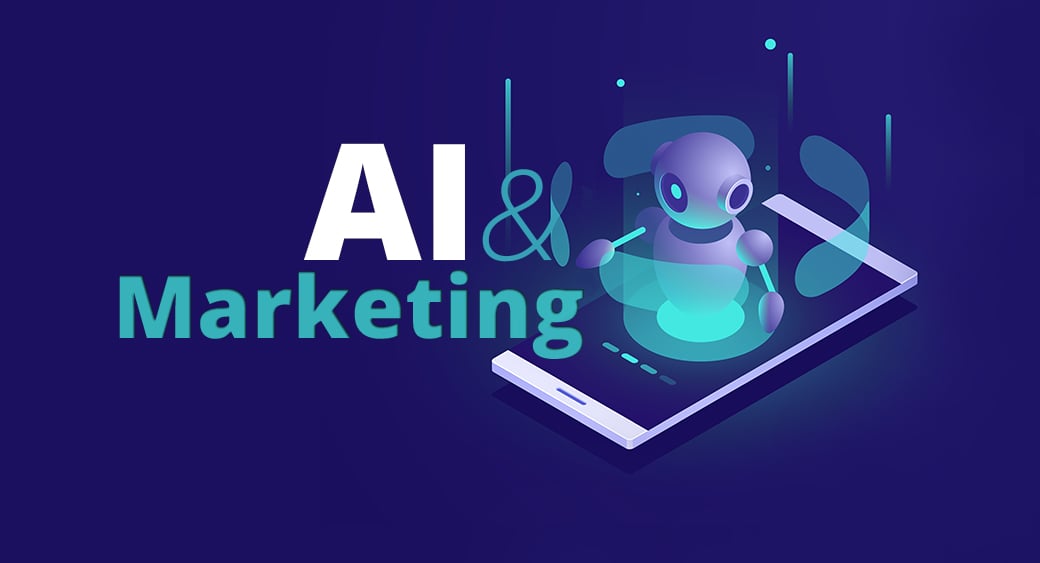
In this article, we intend to focus more intensely on AI in digital marketing and some examples.
What Is AI?
As known to all, AI is the abbreviation for artificial intelligence, a branch of computer science. It proposes the creation of devices that simulate the human capacity to reason, make decisions, and solve problems. Its base is directly related to data. It acts with splendid big data. Thus, AI collects data, analyzes information, and defines the best solution with pure logical reasoning in a computational view.
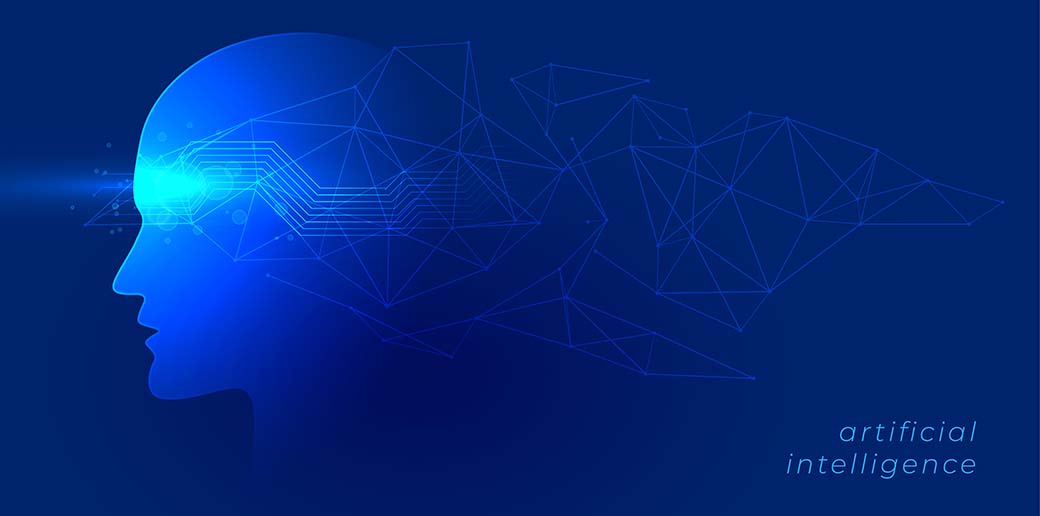
Digital marketing is just coming into the moment of IA. The technology now exists to automate and scale artificial intelligence digital marketing campaigns, and the development is accelerating.
AI in Digital Marketing – Examples
A few years back, marketers weren’t sure about implementing artificial intelligence into their digital marketing plans. But as time went by, it gained considerable trust among marketers.
Since AI deals with a problem in a purely logical view, it cuts down the ambiguity regarding results. And, as we know, many companies gained significant benefits. One great benefit of artificial intelligence is efficient and scalable task automation. Here, we present some examples of AI in digital marketing.
1. Product /Content Recommendations
A study made by McKinsey Company showed that 35% of what consumers purchase on Amazon and 75% of what they watch on Netflix comes from product recommendations through this strategy of AI in digital marketing. Content personalization is perfect for greater participation among users. Personalization means bringing the first relevant and personalized products to the related audiences. Amazon, Spotify, and many other brands do that to increase conversations.

This has inspired other major brands to follow the same suit with their version of AI-powered personalized recommendations. As a result, the target audience will see only relevant products in front of them. It is like turning on lights in an already well-lit room to use the best product or content recommendations. AI-powered products or content recommendations can turn on lights in a room you didn’t even know you had.
2. AI in Digital Marketing – Emails
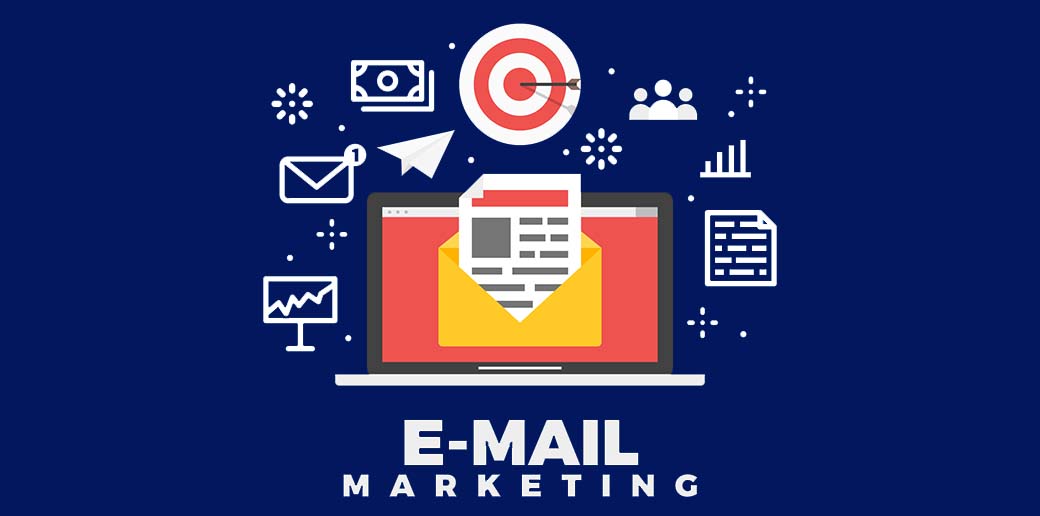
Email marketing does not escape adopting initiatives that incorporate artificial intelligence. AI in email marketing helps you get closer to your users through automated and personalized responses. As we know, artificial intelligence can segment your audience more precisely. It is before personalizing content for your users.
AI uses much more complex algorithms that analyze your customer’s history, activity, and preferences for your services. Artificial intelligence collects data and information to create personalized emails. If the personalization of emails is optimal, the users will feel that you know them, satisfying their purchase needs.
In addition, artificial intelligence studies the best moments to contact your users. To do this, AI collects information about users’ online activity. So, the chances of reading your offers grow considerably. Each user has a different schedule, which is the optimal way to contact them when it suits them best.
You can implement different tools when faced with AI in digital marketing for email marketing. For instance, you can use Phrasee to create issues, email bodies, or call-to-action copies to get better results than those designed by human beings.
3. Chatbots as AI in Digital Marketing
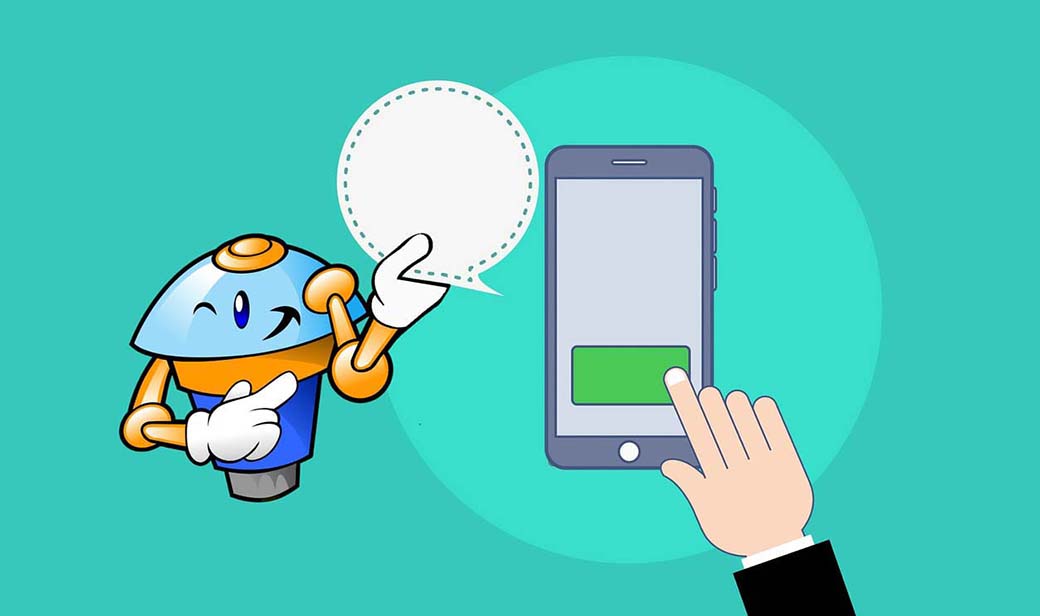
More and more companies have a virtual assistant on their website. For companies, using chatbots helps their customers discover the most frequent questions they have for a product or service, without the need for human intervention.
The potential customers can have the most human conversation possible with a virtual assistant that uses artificial intelligence to improve their user experience. The AI has machine learning to learn and update algorithms. As a result, it will improve constantly. So, the more interactions our chatbot makes, the better results it will give us.
Many people do not enjoy a conversation with a chatbot with automated and rigid answers. If a user has a complex question, the robot cannot give a good answer. But with AI it’s all simpler. The chatbot learns to give more accurate answers thanks to its ability to learn.
It is a tool that will help us improve our customer service since their responses are immediate. It allows us to offer customer service for 24 hours a day, 7 days a week. In turn, they are able to manage a large volume of queries simultaneously and maintain a high level of service quality.
4. AI in Digital Marketing – Video Marketing
Video has proven time and time again that it is a valuable asset. Cisco predicts that 80% of Internet traffic will be video by 2021. And more than 52% of marketers think video can drive a higher ROI than other marketing tactics. Artificial intelligence has done a lot with video marketing that marketers can leverage to their benefit.
Netflix, one of the world’s largest media service providers, also uses AI to suggest video content to its subscribers. This is fairly relevant for anyone who wishes to increase engagement and conversion to their business. Thus, you need to think about what types of videos to make. An interesting story or just your company history? It’s very important to create an engaging video.
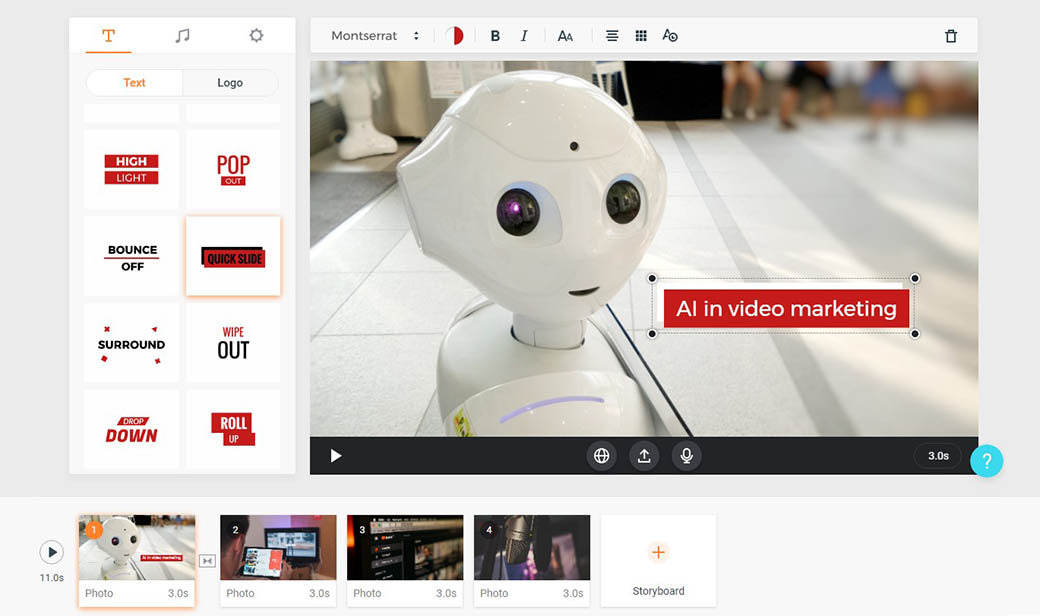
Creating Videos for Video Marketing – Easy Ways
It could be strenuous and time-consuming if you do not have a team to design one. But many video tools like FlexClip video maker will get you out of the pain. Powered by AI, FlexClip allows you to search stock videos, photos, and music you like from its could database. Moreover, it lets you create high-quality videos with little knowledge of video editing and designing. It’s easy, powerful, and flexible to create videos for online marketing in minutes. No matter if you want to create a video for real estate, marketing tutorial, fitness, event planning, travel or any other. The video tools will assist you in producing a video with appropriate themes and effects. With only three steps, you can make a great video for marketing.
Once you finish your high-quality video, you can save it and upload it to YouTube. By the way, YouTube also uses artificial intelligence in many ways. For example, YouTube removed 8.3 million objectionable videos automatically in Q1 this year. And 76% of those videos were found by artificial intelligence classifiers, according to YouTube’s Transparency Report.
Why Should We Use AI in Digital Marketing?
Artificial intelligence allows machines to learn from experience, adapt to new inputs, and act human-like tasks. It is becoming increasingly popular, and it will boost our business easier ever than before.
AI in Digital Marketing – More Efficient Work
Artificial intelligence automates repetitive learning and increases precision. It works for more accuracy and fewer errors. Besides, the process is automatic, which means greater work efficiency.
Deeper Analysis of Data
With the help of big data, Artificial intelligence analyzes more and deeper for valuable insights. A few years ago, building a fraud detection system with five hidden layers was almost impossible. However, it has changed with incredible computer power and big data. Feed it with a lot of data to train deep learning, and it will analyze directly from the data and give you the precise result. In short, feeding it with more data will give you a more accurate result.
Smarter Algorithms for Campaigns
Since it is from past data, it adapts to new input through progressive learning algorithms. You know, voice searching assistant, this is one of the examples of its smart sides. Industries, including medicine, banking, marketing, and many others, have already used it for their service.
How to Use AI in Digital Marketing
With new technologies emerging and becoming more accessible daily, we can create better solutions and increase profits intelligently with AI in digital marketing.
1. Create Marketing Content
Artificial intelligence in content marketing is here to make life easier and leave more productive work. Give this revolution a try and improve your processes! We are sure you will not regret it. This is a really interesting area for AI.
Machines can’t write a political opinion column or a sentimental blog post. However, there are certain areas where AI-generated content can be helpful and help attract visitors to your site. AI content writing programs can pick elements from a dataset and structure an article like human-made for certain functions. It is said that the writing program called “WordSmith” produced 1.5 billion pieces of content in 2016.
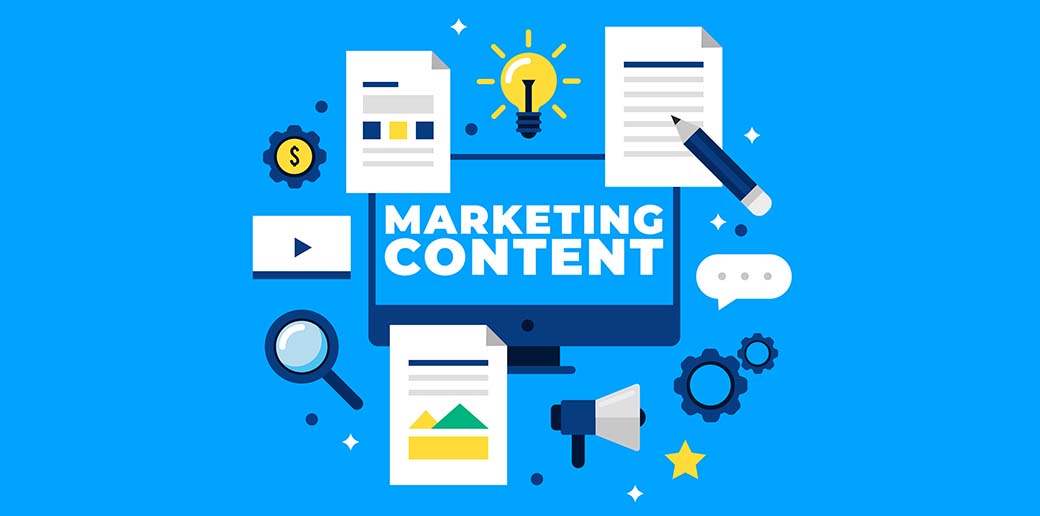
The artificial intelligence writer is useful for producing data-focused content. Quarterly earnings reports, sports games, and market data are examples of this. If you operate in a relevant niche, such as financial services, AI-generated content can be useful for your marketing content.
As known to all, creatively produced content that seeks a true dialogue with the readers is essential to good marketing content. That is to say; you can use Machine Learning to analyze data, create new ideas, and build a custom content strategy. So, you may be more likely to create more efficient, personalized, and value-creating content. Also, it makes it easier for search engines to find it.
2. Use Data Filtration and Analysis
It is possible to apply propensity modeling to many different areas. For instance, you can use it to predict a customer’s conversion likelihood. In other words, you can apply it to predict when a customer might convert. It also clarifies which customers are most likely to make repeat purchases or which products most visitors will like.
The main thing to remember is that a propensity model is good since the data provided to create it is accurate. So, if there are errors in your data or a high level of randomness, you cannot make accurate predictions.

According to the sixth edition of DOMO’s report, over 2.5 quintillion bytes of data are created every single day, and it’s only going to grow from there. Accordingly, it’s meaningful to use and analyze this data to enhance customer experience, personalize products or services, and target specific customers.
However, it’s time-consuming and challenging to consolidate, analyze and mine that data to determine consumer patterns for humans. Don’t worry! With artificial intelligence technology, you can handle complex organizational tasks quickly and easily. Artificial intelligence will mine the data and get business insight through analysis. This will help the brand develop new products and improve them as time goes by.
3. Apply Voice Searches and Virtual Assistants
Voice search will change future SEO strategies, forcing brands to keep up. Voice searchers will have organic results with high purchase intent. This will be especially true if we consider the increased presence of virtual assistants.

A virtual assistant is one of the prime examples of voice search. Voice searches need marketers to optimize content closer to a user’s verbal expression. Thus, in this way, those typical long-tail keywords would be taken over by more conversational keywords. It depends on what users say or do, using a voice search. As voice search is taking over the typical searches, a brand that knows how to benefit from voice searches will be able to boost its organic traffic considerably.
Today, artificial intelligence (AI) and virtual assistants can already hold a conversation. Moreover, they can understand exactly where they can help, enhancing each interaction. With AI, we witnessed an evolution in Internet searches and search engine optimization (SEO): voice search and Google’s algorithm, RankBrain. Let’s see some virtual assistants.
Voice Assistants – Examples
Siri, Apple’s virtual assistant, appeared in 2011. Since then, it has been indispensable for iPhone, iPad, and other iOS device users. With the launch of HomePod in 2017, Siri became the assistant present also on the smart speaker.
Another example is Alexa. Amazon’s virtual assistant is mostly known for being present on the Amazon Echo device. Driven by artificial intelligence, Alexa uses machine learning to get information about the user. Furthermore, Alexa is known to become increasingly personalized.
One more outstanding example is Google Assistant. As its name makes it clear, it is Google’s assistant. You can activate it with the famous phrase “Ok, Google.” In addition to several Android smartphones, the assistant is on Google Pixel and Google Home.
Besides Siri, Alexa, and Google Assistant, there are many other virtual assistants like Cortana, Bixby, etc.
4. Involve Sales Forecasting
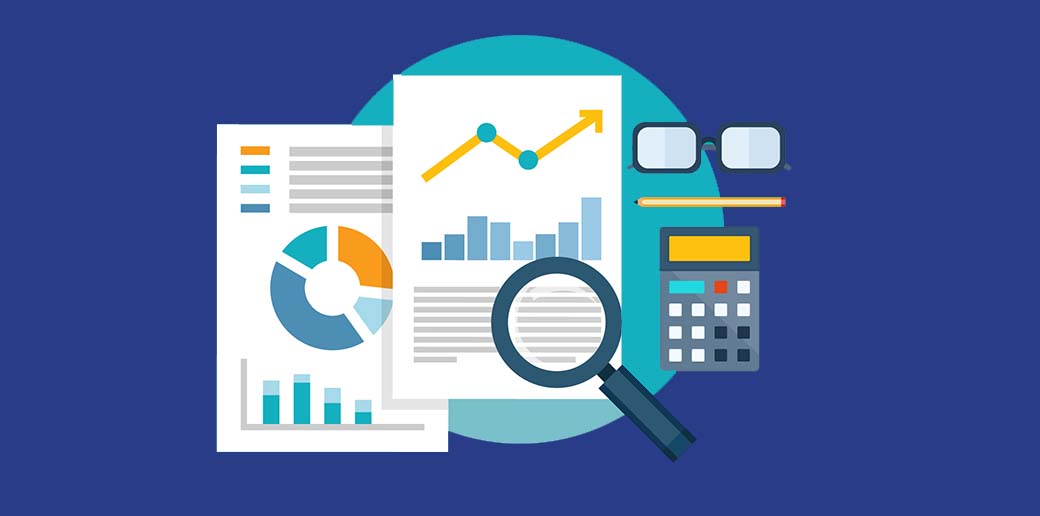
One of the great benefits of AI is the ability to predict customer behaviors and forecast sales. Combining data mining, statistics, and sales modeling, AI uses predictive analytics to forecast sales for online businesses.
With the help of artificial intelligence and machine learning, demanding forecasting will become increasingly accurate and can focus on specific areas in their digital strategies. One tool that utilizes these technologies is the SR Demand ForecastingAI, the Symphony RetailAI, trusted by over 1200 FMCG retailers and CPG manufacturers. The solution has yielded good results for many companies in the United States and Europe.
For example, Walmart, one of the largest multinational retail companies in America, observed $1 billion using AI sales forecasting in its recent operations, increasing sales by 10% to 15%. Rakuten, a leading Japanese electronic commerce and online retailing company based in Tokyo, uses AI applications to analyze and predict customer behaviors. With the Rakuten Institute of Technology, Rakuten could get accurate sales forecasting by analyzing its 200 million products.
Sales forecasting is critical to the success of organizations’ sales planning. It is performed based on the study of business history (sales made in previous periods), industry-wide comparisons, and market trends. This will lead to great business decisions and predict short and long-term performance.
5. Use Content Curation
AI content curation allows you to better engage visitors to your site through relevant, personalized content. Many websites use this technique in the section “customers who buy X also buy Y.” And it can also be implemented in blog content to customize site messages more broadly.
It’s also a great technique for subscription companies, where the more people use the service, the more data can be used for machine learning. Thus, better content can improve the service. Just like Netflix, as I mentioned before. It recommends great movies you will like.

The artificial intelligence curator is a set of content collections that can teach you more about AI. The selected videos, articles, pages, and reports are separated into categories so you can find the materials you are most interested in. So, you’ll see the data you can begin with and delve further. By bringing user-liking content to the customer’s search log, AI exponentially increases the possibility of conversions.
To ensure the success of their content, marketers need to make curation an operation. Content curation is a way of sharing articles or other content with readers they are interested in without necessarily producing them. This can be a weapon to make one stand out from so much information. There’s no better time for marketers to start testing how artificial intelligence in content curation can help create highly personalized experiences for your customers.
6. Involve Ad Optimization
The relationship between advertising and the consumer is increasingly narrow, allowing brands to understand their consumers more by generating more relevant and accurate communication. Combining technology, data, and creativity, artificial intelligence is becoming the driving force in developing digital advertising and a valuable tool in any business strategy.
Many digital marketers stuck ads strategies between cost per click (CPC) and cost per acquisition (CPA) since those metrics make them uncomfortable. However, marketers can easily optimize those metrics with artificial intelligence and machine learning. They can easily analyze the bulks of data to recognize the users’ behaviors of previous actions and favor a client’s vision that is completely stripped of conscious and unconscious prejudices. This includes images or products that must be promoted, ad copy for specific demographics, and more.
You can find these strategies on social platforms like Facebook. Artificial intelligence tools allow marketers to analyze customers typically following likes, views, etc. With artificial intelligence tools, marketers can set up a campaign on Facebook and optimize the best group audiences for their services or products. Here you can see one video-making tool called Promo set such ads on Facebook like this.
Conclusion
Digital marketing has become an almost obligatory discipline for those who run businesses online and want to survive. This involves various activities and tools oriented towards various objectives: branding, engagement, increased traffic, attracting potential customers, converting visitors to prospects, generating sales, etc. A different strategy needs to be created for each objective. To make it, we can choose different artificial intelligence tools for help.
Thanks to the increasingly merged artificial intelligence tools in marketing, many of the tedious and time-consuming tasks can be easily dealt with daily. As artificial intelligence continues growing across different industries and segments, marketers need to invest time and resources to try out any strategies and ensure their marketing organization is made for continued success, both now and in the future. I hope this article helps you understand more about AI in digital marketing. Welcome to comment if you have any ideas.


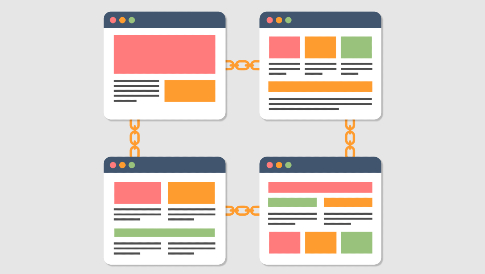
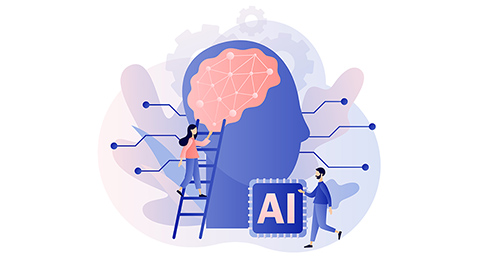
Leave a Reply